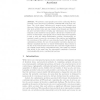Free Online Productivity Tools
i2Speak
i2Symbol
i2OCR
iTex2Img
iWeb2Print
iWeb2Shot
i2Type
iPdf2Split
iPdf2Merge
i2Bopomofo
i2Arabic
i2Style
i2Image
i2PDF
iLatex2Rtf
Sci2ools
114
click to vote
FC
2009
Springer
2009
Springer
Cryptographic Combinatorial Clock-Proxy Auctions
We present a cryptographic protocol for conducting efficient, provably correct and secrecy-preserving combinatorial clock-proxy auctions. The “clock phase” functions as a trusted auction despite price discovery: bidders submit encrypted bids, and prove for themselves that they meet activity rules, and can compute total demand and thus verify price increases without revealing any information about individual demands. In the sealed-bid “proxy phase”, all bids are revealed the auctioneer via time-lapse cryptography and a branch-and-bound algorithm is used to solve the winner-determination problem. Homomorphic encryption is used to prove the correctness of the solution, and establishes the correctness of the solution to any interested party. Still an NP-hard optimization problem, the use of homomorphic encryption imposes additional computational time on winner-determination that is linear in the size of the branch-and-bound search tree, and thus roughly linear in the original (sear...
Auction Despite Price | Combinatorial Clock-proxy Auctions | Cryptography | FC 2009 | Homomorphic Encryption |
| Added | 26 May 2010 |
| Updated | 26 May 2010 |
| Type | Conference |
| Year | 2009 |
| Where | FC |
| Authors | David C. Parkes, Michael O. Rabin, Christopher Thorpe |
Comments (0)

